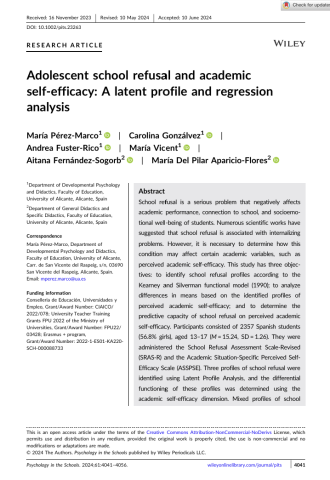School refusal is a serious problem that negatively affects academic performance, connection to school, and socioemotional well-being of students. Numerous scientific works have suggested that school refusal is associated with internalizing problems. However, it is necessary to determine how this condition may affect certain academic variables, such as perceived academic self-efficacy. This study has three objectives: to identify school refusal profiles according to the Kearney and Silverman functional model (1990); to analyze differences in means based on the identified profiles of perceived academic self-efficacy; and to determine the predictive capacity of school refusal on perceived academic self-efficacy. Participants consisted of 2357 Spanish students (56.8% girls), aged 13–17 (M = 15.24, SD = 1.26). They were administered the School Refusal Assessment Scale-Revised (SRAS-R) and the Academic Situation-Specific Perceived Self-Efficacy Scale (ASSPSE). Three profiles of school refusal were identified using Latent Profile Analysis, and the differential functioning of these profiles was determined using the academic self-efficacy dimension. Mixed profiles of school refusal obtained the lowest mean scores on the academic self-efficacy dimension. The findings are discussed with regard to the importance of enhancing perceived academic self-efficacy to prevent school attendance problems in adolescents and young children.
Pérez‐Marco, M., Gonzálvez, C., Fuster‐Rico, A., Vicent, M., Fernández‐Sogorb, A., & Aparicio‐Flores, M. D. P. (2024). Adolescent school refusal and academic self‐efficacy: A latent profile andregression analysis. Psychology in the Schools, 61, 4041–4056. https://doi.org/10.1002/pits.23263










